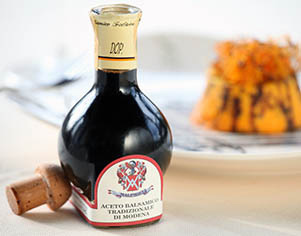是醋,是酒,是醬?身份不明、功效全能的巴薩米克醋現(xiàn)在可是美國餐桌上的新寵,一起來了解有關(guān)它的故事吧!

By James Dixon
穆陽 選 蒲瑤 譯
|
Balsamic is an aromatic, aged types of vinegar from the concentrated juice, of white grapes (wine grapes). It has been produced for over 600 years but only became popular outside Italy after Pavarotti sang its praises in the late 1970s. Balsamic is now the best-selling vinegar in America, accounting for 45 percent of all supermarket vinegar sales. Although called a vinegar, it is nothing like the kind you might splash on your chips or pickle onions with. Instead, you might use it to dress some strawberries or drink as an aperitif. From 1300 to 1860, the northern Italian region of Reggio Emilia and Modena was a Duchy ruled by the Este family who were particularly linked to the production and usage of traditional balsamic vinegar. Throughout this time period this precious liquid can be found in notarial deeds like weddings, inheritances and donations. Records dating back to 1046, show that some of this highly regarded product was even given as a gift to emperor Henry III by the lord of Canossa. The name balsamic comes from balsam and balm which refer to its medicinal properties. The sweet, raisiny juice, skin, and seeds, called grape must, is boiled in open vats until reduced to about half its original volume. This concentrated must is added to the largest of a battery of wooden barrels, which are kept in uninsulated attics in this region where the summers are hot and the winters frosty. The battery comprises barrels of different woods—including oak, cherry, juniper, and mulberry—and sizes. The barrels aren’t sealed; they have cloth-covered openings on top to allow evaporation. Each year, before the vinegar maker adds the new must to the largest barrel, he transfers some of its ever-more concentrated contents to the next largest, and so on down the line, before finally removing a liter or two of the oldest vinegar from the smallest barrel. This is traditional balsamic vinegar. Balsamic vinegar can be used in cooking or as a salad dressing. This fruity vinegar is often used as a replacement for cooking wines because it provides similar flavoring. It is commonly cooked with chicken or sautéed vegetables. Balsamic vinegar can also be added to foods, such as spinach, after cooking to create a unique seasoning. Balsamic Health tips: Balsamic has anti-bacterial and anti-viral properties which make it an effective remedy for treating infections and wounds. Balsamic can help boost the activity of the digestive enzyme pepsin thus improving metabolism. Balsamic can reduce cholesterol level. Balsamic antioxidant may slow the aging process. Balsamic contains important minerals that can strengthen the bones. Balsamic can help prevent anemia and fatigue. Balsamic can help suppress appetite and therefore an aid in controlling weight.
|
巴薩米克醋是一種芳香陳醋,由濃縮的白葡萄(即釀酒葡萄)汁制成。巴薩米克醋已有六百多年的釀造歷史,但直到20世紀(jì)70年代末因受到(意大利歌唱家)帕瓦羅蒂的盛贊才在意大利之外的地區(qū)流行開來。現(xiàn)在,巴薩米克醋是美國最暢銷的醋,占到了超市食醋總銷量的45%。雖被冠以醋之名,它卻完全不同于那種用來蘸薯條或是腌洋蔥的醋。它卻可以用來與草莓相佐,或當(dāng)開胃酒來飲用。 1300年至1860年,意大利北部的雷焦艾米利亞和摩德納大區(qū)一直是埃斯特家族的領(lǐng)地,這個家族與傳統(tǒng)的巴薩米克醋的釀造和食用頗有淵源。在當(dāng)時,這種珍貴的液體可見于婚禮、遺產(chǎn)交接及捐贈等公證場合。早在1046年便有記載顯示,這種備受尊崇的釀品還曾作為國禮由卡諾薩國王贈與亨利三世。巴薩米克醋得名于一種發(fā)音近似的香膏,后者具有藥療的特性。 將甜美的葡萄汁、葡萄皮和葡萄籽混合成的葡萄醪液置于敞口鍋中煮,直至其減少到原量的二分之一。再將這種濃縮的醪液加入一排木桶里最大的一只中,存于這個夏季炎熱、冬季多霜地區(qū)的非絕緣閣樓上。木桶大小各異,使用的木材也不盡相同,有橡樹木、櫻桃木、杜松木和桑樹木。木桶不密封,以布遮蓋頂部以便液體蒸發(fā)。每年,釀醋者都會向最大的桶內(nèi)加入新的葡萄醪液,并將其中濃縮度更高的葡萄醪液移至第二大的木桶中,依此類推,最后于最小的桶中取出一兩升年頭最久的醋。這就是傳統(tǒng)的巴薩米克醋。 巴薩米克醋既可用于烹飪,也可用來為沙拉調(diào)味。這種果醋因散發(fā)著芳香的酒氣也常常代替料酒使用。它通常用來搭配雞肉或煎蔬菜,還可澆于烹好的食物上,如菠菜,以創(chuàng)造出一種獨特的味道。 巴薩米克醋的健康小貼士: 含有抗菌抗病毒成分,能有效治療感染和外傷。 有助于提高胃蛋白酶的活性,提高新陳代謝。 可降低膽固醇。 具有抗氧化性,可延緩衰老。 含多種重要礦物質(zhì),可強健骨骼。 有助于預(yù)防貧血和疲勞。 有助于抑制食欲,因此有益于控制體重。 (來源:英語學(xué)習(xí)雜志) |
|
Vocabulary: aperitif (飯前飲用以促進食欲的)開胃酒 Duchy 公爵領(lǐng)地 notarial 由公證人經(jīng)辦(或處理)的 balsam (治療或鎮(zhèn)痛用的)香膏,后面的balm同義 sauté 〈法〉淺煎 |
